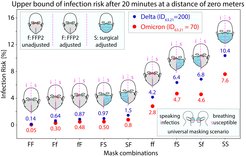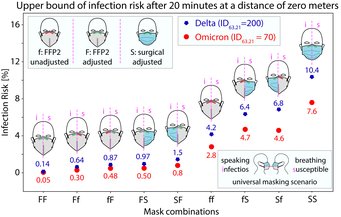Masks potentially more efficient against Omicron
Researchers at the Max Planck Institute for Dynamics and Self-Organization (MPIDS) found that well-fitted face masks protect at least as well against the Omicron variant of SARS-CoV-2 as they do against Delta. Wearing masks can thus be an efficient protection, despite the higher infectivity of the new variant.
“The results of our analyses were surprising to us”, says Mohsen Bagheri, research group leader at the Max Planck Institute for Dynamics and Self-Organization. “So far, observations suggest that with the new Omicron variant, most viral load is present in larger particles produced mainly in the upper airways – and hence can be filtered very efficiently with face masks” he explains. This calculation is based on the internationally recognized study published in December 2021 in the journal “Proceedings of the National Academy of the United States of America”, for which Mohsen Bagheri and Eberhard Bodenschatz, director the MPIDS, are the corresponding authors.
The rapid spread of the new Omicron variant of SARS-CoV-2 is a major concern in several countries, including Germany. One reason could be a up to a factor three lower viral dose required for infection compared to the Delta variant. At the same time, recent studies have suggested that the virions are mostly in the upper airways with the viral load being like Delta.

The particles which are exhaled during speaking and breathing cover a broad size range. They can be in the nanometer range up to small droplets which are in the millimeter range and visible by eye. The researchers at the MPIDS measured exhaled particles in more than 130 subjects aged 5 to 80 years.
They found that particles from the lungs at the time of production are smaller than 5 micrometers, whereas larger droplets originate from the upper airways. In the case of Omicron, these bigger particles contain a higher dose of virions and can be held back more efficiently compared to the smaller ones. For this reason, the upper bound of infection risk from Omicron could even be lower than for the previous variants, provided everyone is wearing a face mask. Without this assumption, the higher infectivity of Omicron prevails.
"Further data and observations are needed to consolidate these results, but for now we can assume that the risk of infection with the Omicron variant when everyone uses a well-fitted FFP2 mask is at least similar to that of the Delta variant, if not lower." says Mohsen Bagheri. “The protection by filtering face masks is fantastic especially when people are silent” adds Eberhard Bodenschatz. “For speaking, the number of larger aerosol particles is much higher, which cause spreading of infectious diseases such as Covid-19. Hence, the proverb ‘speaking is silver and silence is gold’ has a new and important meaning” concludes Bodenschatz.
More information on the background of this study can be found in the following scientific publications:
- Bagheri, G., Thiede, B., Hejazi, B., Schlenczek, O., & Bodenschatz, E. (2021). An upper bound on one-to-one exposure to infectious human respiratory particles. Proceedings of the National Academy of Sciences, 118(49).
- Chen, J., Wang, R., Gilby, N. B., & Wei, G. W. (2021). Omicron (B. 1.1. 529): Infectivity, vaccine breakthrough, and antibody resistance. ArXiv.
- Chan, M. C., Hui, K. P., Ho, J., Cheung, M. C., Ng, K. C., Ching, R., ... & Nicholls, J. (2021). SARS-CoV-2 Omicron variant replication in human respiratory tract ex vivo.
- Diamond, M., Halfmann, P., Maemura, T., Iwatsuki-Horimoto, K., Iida, S., Kiso, M., ... & Simon, V. (2021). The SARS-CoV-2 B. 1.1. 529 Omicron virus causes attenuated infection and disease in mice and hamsters. Research square.
- Abdelnabi, R., Foo, C. S. Y., Zhang, X., Lemmens, V., Maes, P., Slechten, B., ... & Neyts, J. (2021). The omicron (B. 1.1. 529) SARS-CoV-2 variant of concern does not readily infect Syrian hamsters. bioRxiv.
- Puhach, O., Adea, K., Hulo, N., Sattonnet-Roche, P., Genecand, C., Iten, A., ... & Meyer, B. (2022). Infectious viral load in unvaccinated and vaccinated patients infected with SARS-CoV-2 WT, Delta and Omicron. medRxiv.
- Hay, J. A., Kissler, S. M., Fauver, J. R., Mack, C., Tai, C. G., Samant, R. M., ... & Grad, Y. H. (2022). Viral dynamics and duration of PCR positivity of the SARS-CoV-2 Omicron variant. medRxiv.
- Bagheri, G., Schlenczek, O., Turco, L., Thiede, B., Stieger, K., Kosub, J. M., ... & Bodenschatz, E. (2021). Exhaled particles from nanometre to millimetre and their origin in the human respiratory tract. medRxiv.
